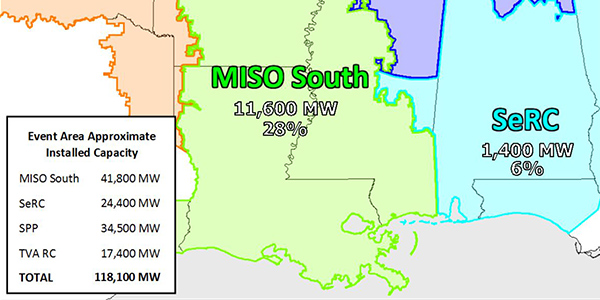By Rich Heidorn Jr.
QUEBEC CITY, Quebec — Regulators’ call for a generator weatherization requirement faces an uphill battle if prior history and feedback at last week’s NERC Member Representatives Committee meeting are any indication.
NERC’s Steven Noess and FERC’s Heather Polzin gave the MRC a briefing on the FERC/NERC report released last month on their joint investigation into the cold weather event that nearly forced load shedding in MISO South on Jan. 17, 2018.
FERC and NERC said the findings indicated the need for reliability rules requiring generator owners and operators to winterize their units and provide their reliability coordinators and balancing authorities with information about their preparations. (See FERC Orders Cold Weather Reliability Standard.)
But several commenters at the MRC questioned regulators’ authority to issue such requirements, citing arguments that helped sink such an initiative in 2013.
During the 2018 event, abnormal cold and higher-than-forecast demand caused MISO and SPP to seek voluntary load reductions — and would have forced shedding of firm load if the next worst single contingency had occurred in MISO South.
The report found 44% of outages were either directly or likely related to the extreme cold and that one-third of generator owners/operators who had outages, derates or failures to start did not have winterization procedures. Limited gas supplies also contributed to the problems.
The report echoed FERC and NERC’s recommendation for a winterization standard in their joint report on the February 2011 cold snap in Texas and New Mexico. That incident resulted in load shedding in the ERCOT, Salt River Project and El Paso Electric territories.
The 2011 report said NERC staff had concluded there would be a reliability benefit from “amending the [Emergency Preparedness and Operations] reliability standards to require generator owner/operators to develop, maintain and implement plans to winterize plants and units prior to extreme cold weather.”
SRP proposed a standard authorization request in July 2012. But after receiving comments mostly in opposition, the Standards Committee rejected the SAR in June 2013.
PJM had noted that Texas had last experienced the extreme weather seen in 2011 about 20 years prior. “It is illogical for a generator owner to invest money in a project today when the project becomes useful only once in 20 years,” the RTO said.
Public Service Enterprise Group and the Electric Power Supply Association had contended FERC and NERC lacked the authority for such a standard, saying requirements related to generation adequacy are outside the boundaries of Federal Power Act Section 215, which Congress approved in 2005 to authorize mandatory reliability standards.
“Adequacy regulations remain under the authority of the states,” EPSA said. PSEG agreed, saying generation adequacy issues “are properly addressed by either organized markets or by state or local regulators.” (Indeed, a high generator outage rate during the 2014 polar vortex led PJM to approve its Capacity Performance program, which imposed tougher penalties for generator nonperformance.)
SAR Rejected
In its July 2013 letter rejecting the SAR, the Standards Committee cited the Operating Committee’s adoption of a generator winter readiness guideline.
Noess, NERC’s director of regulatory programs, said the organization’s videos, lessons learned, guidance and outreach have improved overall generator performance. “This is really intended to set a baseline of minimum expectations for those that may not have reacted or responded the same way as others to all those other recommendations,” he said.
Trustee Fred Gorbet noted the report’s finding that more than one-third of the GO/GOPs that lost generation during the MISO South event did not have a winterization plan. “That means that two-thirds of the units … did have plans,” he said. “I find that troubling as well.”
But the new call for a mandatory standard also faced some skepticism.
Martin Sidor, director of regulatory compliance for NRG Energy, said that while generator performance was “embarrassing,” he questioned whether a standard is the answer. “While I agree with the intent, I don’t know if it would be appropriate to execute it. … I would urge caution on something like this,” he said.
Devin Hartman, CEO of the Electricity Consumers Resource Council, said the MISO South incident is of particular interest to the industrial customers who make up his membership, which represents large loads on the Gulf Coast.
But he said a standard might encroach on “procurement decisions that are otherwise subject to prudency reviews” by state regulators. He asked whether the joint team had any estimates on the costs of complying with a standard.
Polzin, an attorney-advisor in FERC’s Office of Enforcement, said they had not. “The reason is because we’re only proposing that there be a SAR … [to create] an industry stakeholder process and that that feedback would come at that time,” she said.
Andy Dodge, director of FERC’s Office of Electric Reliability, urged stakeholders to read the new report. “I think the report is very objective. It’s very data-based. It tells a factual story of what actually took place. I think the conclusions are very well documented. … I think the recommendations are very reasonable,” he said. “In my opinion, this is just basic good practices. … I don’t see these as extreme recommendations.”
At the very least, Polzin said, grid operators should be aware of the winter capability of the generators in their footprint.
Generators that choose not to invest in weatherization may be forgoing potential revenue and conceding “if it goes below 10 degrees, I’m just not going to show up,” she said. “For me, personally … that’s fine. But the important thing is: Does you RC and BA know that you’re making that decision?”








